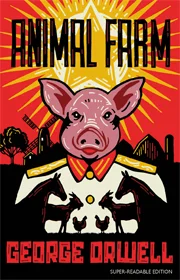
“Animal Farm” is a thought-provoking political satire by George Orwell. Set on a farm in England, the story begins with the animals revolting against their human owner, Mr. Jones. Inspired by the vision of Old Major, a wise boar, the animals successfully overthrow Mr. Jones and establish their own government. Led by pigs Napoleon and Snowball, the new regime promises equality for all. However, as time unfolds, the pigs’ actions raise questions about the true nature of power and the ideals they once championed. The narrative unfolds as a cautionary tale about the corruption of authority and the complexities of political revolutions.
Read Animal Farm Flipbook:
Listen to Animal Farm Audiobook:
Title: Animal Farm
Author: George Orwell
Genre: Political Satire
Publication Year: 1945
Setting: A farm in England
Main Characters:
• Old Major (boar)
• Napoleon (pig)
• Snowball (pig)
• Boxer (horse)
• Clover (horse)
Plot Summary:
• Animals on Manor Farm rebel against their human owner, Mr. Jones.
• Old Major inspires the rebellion with his vision of animal equality.
• The animals successfully overthrow Mr. Jones and establish their own government.
• Pigs Napoleon and Snowball lead the new regime.
• Gradually, the pigs betray the principles of the revolution, becoming indistinguishable from the humans they replaced.
Themes:
• Allegory of the Russian Revolution and Stalinist era.
• Corruption of power.
• Dangers of blind obedience.
• Critique of totalitarianism.
Significance:
• Widely regarded as a classic in political literature.
• Orwell’s critique of totalitarianism and warning about the abuse of power.
• Relevant to discussions about political corruption and societal manipulation.
Legacy:
• Influential in shaping discourse on politics and power.
• Continues to be studied in schools worldwide.
• Timeless relevance in understanding the dynamics of political revolutions and their aftermaths.
Working Title: George Orwell initially considered several titles for the book, including “Animal Farm: A Fairy Story” and “Animal Farm: A Satire.” The final title, “Animal Farm,” was chosen to convey a simpler and more direct message.
Symbolism of Characters: The characters in “Animal Farm” represent real historical figures. For example, Napoleon and Snowball are allegorical representations of Joseph Stalin and Leon Trotsky, key figures in the Russian Revolution.
Inspiration from Russian Revolution: Orwell drew inspiration from the events of the Russian Revolution of 1917 and the subsequent rise of Stalinist totalitarianism. The book serves as a powerful allegory, highlighting the dangers of unchecked power.
Publication Challenges: Finding a publisher for “Animal Farm” was challenging initially. Some publishers were hesitant to release a book critical of the Soviet Union during World War II when the USSR was an ally against Nazi Germany. Eventually, Secker & Warburg published it in 1945.
Rejected Preface: Orwell wrote a preface to “Animal Farm” explaining why he wrote the book and the difficulties he faced in getting it published. However, the publisher decided not to include the preface, as it was deemed too controversial at the time.
Influence of Spanish Civil War: Orwell’s experiences during the Spanish Civil War also influenced “Animal Farm.” His disillusionment with the infighting among leftist factions and the betrayal by the Soviet Union contributed to the book’s underlying themes.
Seven Commandments: The Seven Commandments, initially established by the animals for self-governance on the farm, are a satirical take on the principles of communism. As the story progresses, the commandments are altered, reflecting the corruption of the pigs in power.
Film Adaptations: “Animal Farm” has been adapted into several film versions. One notable adaptation is the animated film released in 1954, which was the first British animated feature to be released internationally.
Impact on Literature: “Animal Farm” is regarded as a classic of political literature and is often studied in schools around the world. It remains influential in discussions about political systems, corruption, and the abuse of power.
Orwell’s Warning: George Orwell’s “Animal Farm” serves as a timeless warning about the potential for those in power to betray the ideals they claim to uphold. The book’s enduring relevance is seen in its ability to resonate with readers across different historical and political contexts.